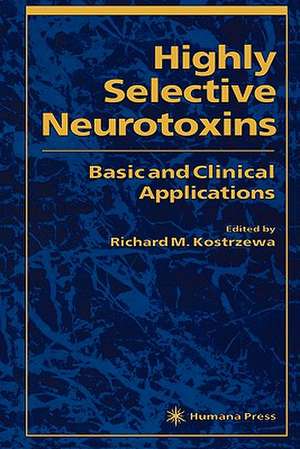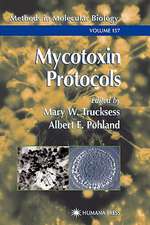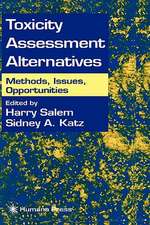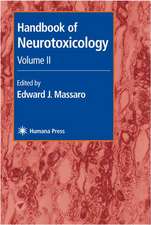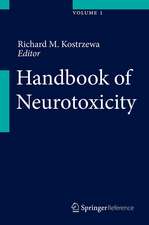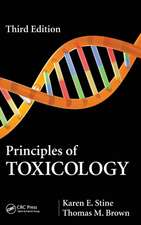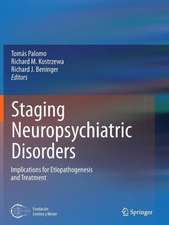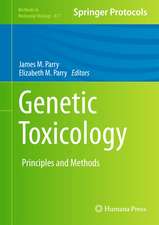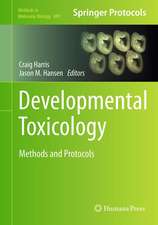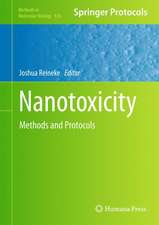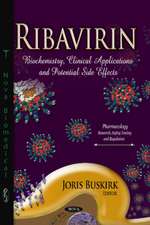Highly Selective Neurotoxins: Basic and Clinical Applications: Contemporary Neuroscience
Editat de Richard Kostrzewaen Limba Engleză Paperback – 19 noi 2010
| Toate formatele și edițiile | Preț | Express |
|---|---|---|
| Paperback (1) | 1417.38 lei 6-8 săpt. | |
| Humana Press Inc. – 19 noi 2010 | 1417.38 lei 6-8 săpt. | |
| Hardback (1) | 1426.53 lei 6-8 săpt. | |
| Humana Press Inc. – 30 oct 1997 | 1426.53 lei 6-8 săpt. |
Din seria Contemporary Neuroscience
- 5%
 Preț: 1128.63 lei
Preț: 1128.63 lei - 18%
 Preț: 965.52 lei
Preț: 965.52 lei - 5%
 Preț: 1108.35 lei
Preț: 1108.35 lei - 18%
 Preț: 1228.15 lei
Preț: 1228.15 lei - 18%
 Preț: 1229.73 lei
Preț: 1229.73 lei - 18%
 Preț: 1231.64 lei
Preț: 1231.64 lei - 18%
 Preț: 945.47 lei
Preț: 945.47 lei - 18%
 Preț: 1244.08 lei
Preț: 1244.08 lei - 15%
 Preț: 638.76 lei
Preț: 638.76 lei - 18%
 Preț: 1240.47 lei
Preț: 1240.47 lei - 18%
 Preț: 1385.99 lei
Preț: 1385.99 lei - 18%
 Preț: 1227.84 lei
Preț: 1227.84 lei - 18%
 Preț: 1220.88 lei
Preț: 1220.88 lei - 18%
 Preț: 961.55 lei
Preț: 961.55 lei - 15%
 Preț: 695.70 lei
Preț: 695.70 lei - 18%
 Preț: 959.82 lei
Preț: 959.82 lei - 5%
 Preț: 1112.17 lei
Preț: 1112.17 lei - 18%
 Preț: 1233.83 lei
Preț: 1233.83 lei - 18%
 Preț: 950.96 lei
Preț: 950.96 lei - 24%
 Preț: 799.51 lei
Preț: 799.51 lei - 18%
 Preț: 954.77 lei
Preț: 954.77 lei - 18%
 Preț: 1227.21 lei
Preț: 1227.21 lei - 5%
 Preț: 1117.46 lei
Preț: 1117.46 lei - 18%
 Preț: 1248.02 lei
Preț: 1248.02 lei - 18%
 Preț: 949.10 lei
Preț: 949.10 lei - 5%
 Preț: 1114.35 lei
Preț: 1114.35 lei - 15%
 Preț: 694.22 lei
Preț: 694.22 lei - 18%
 Preț: 950.52 lei
Preț: 950.52 lei - 5%
 Preț: 1124.07 lei
Preț: 1124.07 lei - 5%
 Preț: 1117.10 lei
Preț: 1117.10 lei - 24%
 Preț: 1089.45 lei
Preț: 1089.45 lei - 18%
 Preț: 1227.52 lei
Preț: 1227.52 lei - 18%
 Preț: 955.08 lei
Preț: 955.08 lei
Preț: 1417.38 lei
Preț vechi: 1491.99 lei
-5% Nou
Puncte Express: 2126
Preț estimativ în valută:
271.25€ • 294.54$ • 227.85£
271.25€ • 294.54$ • 227.85£
Carte tipărită la comandă
Livrare economică 22 aprilie-06 mai
Preluare comenzi: 021 569.72.76
Specificații
ISBN-13: 9781617370472
ISBN-10: 1617370479
Pagini: 420
Ilustrații: XII, 404 p. 9 illus.
Dimensiuni: 155 x 235 x 22 mm
Greutate: 0.61 kg
Ediția:Softcover reprint of hardcover 1st ed. 1998
Editura: Humana Press Inc.
Colecția Humana
Seria Contemporary Neuroscience
Locul publicării:Totowa, NJ, United States
ISBN-10: 1617370479
Pagini: 420
Ilustrații: XII, 404 p. 9 illus.
Dimensiuni: 155 x 235 x 22 mm
Greutate: 0.61 kg
Ediția:Softcover reprint of hardcover 1st ed. 1998
Editura: Humana Press Inc.
Colecția Humana
Seria Contemporary Neuroscience
Locul publicării:Totowa, NJ, United States
Public țintă
ResearchCuprins
1 6-Hydroxydopamine and Related Catecholaminergic Neurotoxins: Molecular Mechanisms.- 2 The Use of Neurotoxins to Lesion Catecholamine-Containing Neurons to Model Clinical Disorders: Approach for Defining Adaptive Neural Mechanisms and Role of Neurotrophic Factors in Brain.- 3 6-Hydroxydopamine as a Tool for Studying Catecholamines in Adult Animals: Lessons from the Neostriatum.- 4 6-Hydroxydopa, a Catecholamine Neurotoxin and Endogenous Excitotoxin at Non-NMDA Receptors.- 5 2-Chloroethylamines (DSP4 and Xylamine): Toxic Actions on Noradrenergic Neurons.- 6 MPTP: A Dopaminergic Neurotoxin.- 7 Haloperidol-Derived Pyridinium Metabolites: Structural and Toxicological Relationships to MPP+-Like Neurotoxins.- 8 The Neurotoxic Effects of Continuous Cocaine and Amphetamine in Habenula.- 9 Evidence for and Mechanism of Action of Neurotoxicity of Amphetamine Related Compounds.- 10 Molecular Mechanisms of Action of 5,6- and 5,7-Dihydroxytryptamine.- 11 Use of 5,6- and 5,7-Dihydroxytryptamine to Lesion Serotonin Neurons.- 12 Selective Cholinergic Neurotoxins: AF64A and 192-IgG-Saporin.- 13 Glutamatergic Receptor Agonists and Brain Pathology.- 14 Neurotoxicity of NMDA Receptor Antagonists.- 15 Toxic Vanilloids.
Textul de pe ultima copertă
In Highly Selective Neurotoxins, experienced experimentalists critically review and evaluate the most common and important neurotoxins used today to precisely destroy selected neurons. Each informative chapter thoroughly describes the significant mechanisms of action of a neurotoxin, as well as fully discussing the limits on its use and its clinical applicability. Several clinically oriented chapters are significant for neurologists treating Parkinsonism, for psychiatrists treating drug abuse and neurodegenerative disorders, and for primary care physicians treating patients with appetite suppressants.
Highly Selective Neurotoxins provides all the basic knowledge needed to obtain a predictable experimental outcome with these neurotoxins. Its authoritative coverage of the newest findings on experimentally important neurotoxins makes their proper use and their limitations clear and practical from both experimental and theoretical points of view.
Highly Selective Neurotoxins provides all the basic knowledge needed to obtain a predictable experimental outcome with these neurotoxins. Its authoritative coverage of the newest findings on experimentally important neurotoxins makes their proper use and their limitations clear and practical from both experimental and theoretical points of view.
